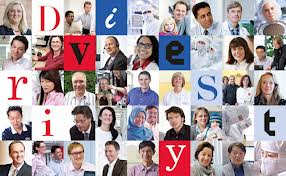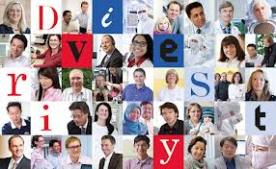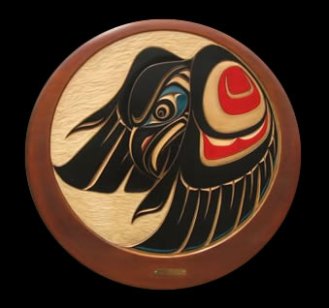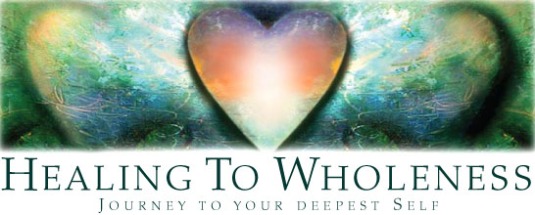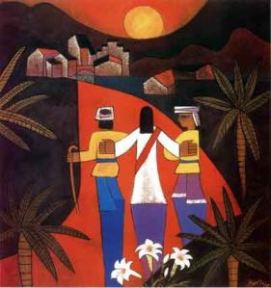Sermon – May 25th 2014
6th of Easter (Year A)
Celebration of Diversity
By Roland Legge
Isaiah 11:1-9
I love the imagery in Isaiah 11:1-9 of lion and lamb co-habiting together. For me this image is important for us today because it reminds me how God has desired diversity from the beginning of time. In Genesis we are reminded that all of God’s creations was GOOD! If God had not desired diversity, our world would not be so complex, fascinating, awe inspiring and incredible.
The Spirit yearns for each of us to bring forth all of whom God desires us to be. In order to do this faithfully we need to know our own identity and name the lenses of interpretation through which we experience the world. Each of us views the world through many lenses. What are they for you?
Eric Law, one of the speakers at Behold helped each of us at the event to begin to name the lenses through which we experience the world and how others might see us. Here are some of the lenses:
vage
vgender
vphysical ability
vskin color
vracial background
vsexual orientation
vmarried
vsingle
vdivorced
vwidowed
vgeographic location
vmigration history
veducation and where
vreligion
vprofession
veconomic status
vlanguage
vbirth order
vand much more……
Each of us is made up of many cultural components. Which lenses do you see the world through? How do you think others view you?
When we meet another person we all have our first impressions based on some of the lenses I mentioned. The trouble is that many of our first impressions are incorrect. We all have our stereo-types:
vaboriginal people are lazy
vteenagers cannot be trusted
vblond women are dumb
vAsians are good at math
vGay men are sissies
If we really get to know others we know these stereo-types are not true. How have you been hurt by stereo-types?
Jesus showed us how to break through our stereo-types to see each person as an awesome creation of God. Jesus was not afraid to relate to all sorts of people; Pharisees, Samaritans, women, children, tax collectors, prostitutes, the very poor, and the sick. There was no one that Jesus wasn’t willing to connect with.
I believe that Jesus would encourage and challenge us to have congregations that reflected the diversity of our communities. Then why is this so difficult?
It is difficult because it requires a change in our hearts. It is hard because it calls upon us to be open to the Spirit. An openness that will likely call upon us to change the ways we be church. Here is what Eric Law suggests are the leadership skills, whether lay or clergy, that is needs to be lived out in order to diversify our congregations. They are:
vSelf-awareness of cultural values, privilege and power.
vTo see differences as an opportunity for learning
vTo have a commitment to Pluralism, that calls upon us to be open to seeing truths in other religions and cultures.
vTo be intentional about diversifying our faith communities.
As your spiritual I invite you to join me in this time of
transformation, but I cannot do this alone. Each of us needs to take ownership of becoming an inter-cultural church if it is going to happen.
I have been so enriched by inter-cultural experiences. They have not always been easy. I remember attending a Baptist church in Brooklyn New York. I and three others were the only white people in the whole church. We were probably most under-dressed folks in the congregation. While we stuck out like a sore thumb, we were so welcomed. At the end of the service it didn’t seem to matter that were a minority in a large congregation. I can’t remember the details of the service, but I can still feel the welcome and hospitality of the folks at Concord Baptist Church. I think knowing who they are as an African American Baptist congregation, helped them to be open and welcoming to others.
In 1980 I attended the Canadian Yearly Meeting of Canadian Quakers in Nelson B.C. I found myself in a workshop on Gay and Lesbian issues. To my surprise I was the only “straight” person in the whole room. Again I felt welcomed. They could welcome me because they knew who they were.
In a previous community I was blessed to get to know an aboriginal family through a Christian Mission that arranges for parents in prison to be able to give Christmas presents to their children. I was welcomed into a very different world from mine, hearing stories of how our criminal justice system unfairly treats many aboriginal people. I heard a powerful story of how this mother overcame addictions and violence to now work in healing lodge near Prince Albert Saskatchewan. This family could speak to me because they felt proud of being Cree.
All of these experiences changed the way I saw the world. They were uncomfortable at times. But even more so they were liberating in widening my understanding and respect for those people and communities I was not familiar with. These experiences and others often helped me to name my prejudices and see even more the wonder of the Creators handy work. All of these experiences have helped me to feel good about whom I am as a white Canadian of English, Scottish and Irish ancestry.
Our higher power sees us at Foam Lake United Church as wonderfully diverse. We may be mainly Western and Eastern European but if we go far back our ancestors came from many places and now from the Philippines. How much do we know about our own ancestry? How much do others know about us?
People are hungry for faith communities that seek to embrace diversity. Places where each of us are encouraged and challenged to live as followers of Jesus. May we at Foam Lake United continue to live into this vision so that we may find the abundant life that Jesus promised us.
